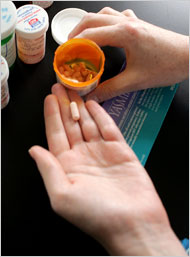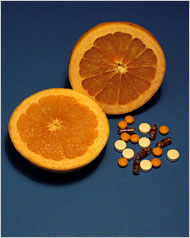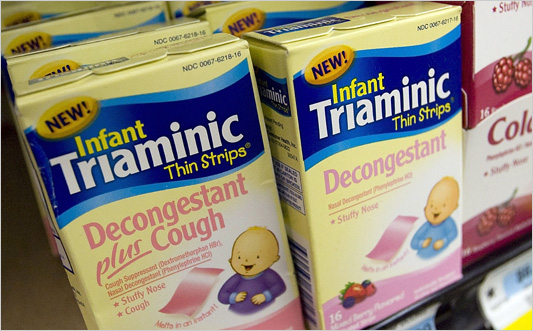 Luscious, long lashes? (Alex Quesada for The New York Times)
Luscious, long lashes? (Alex Quesada for The New York Times)A friend of mine with early glaucoma uses daily drops to prevent vision loss in one eye. The result: one eye has changed color and developed long thick lashes.
But it never occurred to me that people with healthy eyes might consider using these drugs to get a similar side effect. In “Love the Long Eyelashes. Who’s Your Doctor?” my colleague Natasha Singer today writes that Allergan, the company that brought us Botox, has repackaged a glaucoma treatment as the first federally approved prescription drug for growing longer, lusher lashes.
The product has the same formula as Allergan’s eye drops for glaucoma, called Lumigan. It is one of several drugs in a category known as prostaglandin analogs, which are meant to reduce dangerous pressure in the eyeball. But as a side effect, the treatment tends to make the eyelashes of many patients longer and fuller.
Unlike the version for glaucoma, Latisse isn’t used as a drop, but instead is applied once daily to the base of the upper eyelashes with a disposable applicator. One worry is that cosmetic users may experience some other side effects, including red, itchy eyes and changes in eyelid pigmentation. And longer lashes don’t come cheap. Latisse is expected to cost about $120 a month.
I regularly use mascara to lengthen my lashes, but I can’t imagine going to the trouble of daily eyedrops. But Cindy Ross, vice president for sales at Young Pharmaceuticals in Wethersfield, Conn., who participated in the Latisse clinical trial, loves the result so much that she had a doctor prescribe the glaucoma drug to use on her lashes until Latisse becomes commercially available.
“People would say to me ‘Are you wearing false eyelashes?’ — even my own mother asked,” Ms. Ross said. “I wouldn’t stop. I found a way to get it.”
What do you think? Are long lashes important to you? Would you take a daily drug to get them?
















 Healthy living doesn't happen at the doctor's office. The road to better health is paved with the small decisions we make every day. It's about the choices we make when we buy groceries, drive our cars and hang out with our kids. Join columnist Tara Parker-Pope as she sifts through medical research and expert opinions for practical advice to help readers take control of their health and live well every day. You can reach Ms. Parker-Pope at
Healthy living doesn't happen at the doctor's office. The road to better health is paved with the small decisions we make every day. It's about the choices we make when we buy groceries, drive our cars and hang out with our kids. Join columnist Tara Parker-Pope as she sifts through medical research and expert opinions for practical advice to help readers take control of their health and live well every day. You can reach Ms. Parker-Pope at 

